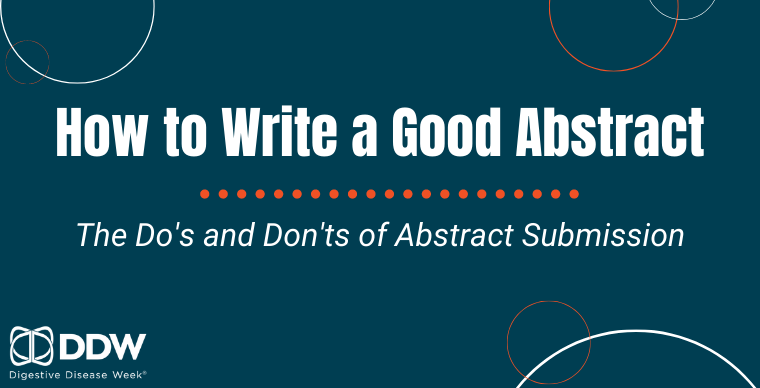Alana Persaud, MD, is a first-year gastroenterology fellow at SUNY Downstate University Medical Center in Brooklyn, New York. She has research interests in both biliary tract disease and inflammatory bowel disease (IBD). She also has a clinical interest in improving access to health care in underserved communities. Alana currently serves as an AGA Young Delegate.
Digestive Diseases Week® (DDW) is the premier gathering of gastroenterology and hepatology professionals in the world. Participation in this conference allows sharing and exchanging of ideas, as well as the opportunity to learn about the latest innovations in the gastrointestinal field. Moreover, if your abstract is chosen for presentation, you have the chance to receive society awards, and gain recognition among your peers. Selection begins with a well thought-out abstract and below are a few do’s and don’ts to assist with the writing process.
Don’t forget to submit your abstract by the deadline, Dec. 3, 2020, at 21:00 Eastern time (UTC –5).
| Do | Don't |
|---|---|
| Consider the word count and other submission guidelines ahead of time and keep these in mind while writing. Forgetting to do this could mean delaying your submission as you edit the size of the abstract. | Keep abbreviations and acronyms to a minimum. If they must be utilized, be sure to define them when they are first used. |
| In the background section, include only pertinent information that is needed to understand your topic. Keep it brief — elaborating too much here reduces the space available to discuss your research findings. | Don’t cite references within the abstract; there is a limited word count and you want to use it in the most effective manner. |
| Clearly state the importance of your study in the discussion and conclusion sections. Does it fulfill a gap in knowledge? Are there important clinical applications of the study? What is the takeaway message from your research? | In the methods section, avoid excessive detail about routine laboratory procedures and statistical software. |
| Leave yourself an adequate amount of time to edit. It is easy to underestimate the amount of time it takes to write a strong, but concise abstract. | Avoid jargon, if possible. You want the project to be easily understood by anyone who reads it, regardless of their academic training or scientific background. |
| Ask colleagues or mentors for assistance with proofreading. A different point of view can be very valuable! | Eliminate grammatical errors and large, cumbersome sentences. Reading an abstract should be effortless and take just a few minutes. Good transitional phrases can be quite helpful here! |



